
Slovenia, officially the Republic of Slovenia, is a country in Central Europe. It is bordered by Italy to the west, Austria to the north, Hungary to the northeast, Croatia to the southeast, and the Adriatic Sea to the southwest. Slovenia is mostly mountainous and forested, covers 20,271 square kilometres (7,827 sq mi), and has a population of 2.1 million. Slovenes constitute over 80% of the country's population. Slovene, a South Slavic language, is the official language. Slovenia has a predominantly continental climate, with the exception of the Slovene Littoral and the Julian Alps. A sub-mediterranean climate reaches to the northern extensions of the Dinaric Alps that traverse the country in a northwest–southeast direction. The Julian Alps in the northwest have an alpine climate. Continental climate is more pronounced towards the northeastern Pannonian Plain. The capital and largest city—Ljubljana—is nearly the centre of the country.
The history of Slovenia chronicles the period of the Slovenian territory from the 5th century BC to the present. In the Early Bronze Age, Proto-Illyrian tribes settled an area stretching from present-day Albania to the city of Trieste. The Slovenian territory was part of the Roman Empire, and it was devastated by the Migration Period's incursions during late Antiquity and the Early Middle Ages. The main route from the Pannonian plain to Italy ran through present-day Slovenia. Alpine Slavs, ancestors of modern-day Slovenians, settled the area in the late 6th Century AD. The Holy Roman Empire controlled the land for nearly 1,000 years, and between the mid-14th century and 1918 most of Slovenia was under Habsburg rule. In 1918, Slovenes formed Yugoslavia along with Serbs and Croats, while a minority came under Italy. The state of Slovenia was created in 1945 as part of federal Yugoslavia. Slovenia gained its independence from Yugoslavia in June 1991, and is today a member of the European Union and NATO.

The location at the junction of the Mediterranean, the Alps, the Dinarides and the Pannonian Plain and the area being traversed by major rivers have been the reasons for the intersection of the main transport routes in Slovenia. Their course was established already in Antiquity. A particular geographic advantage in recent times has been the location of the intersection of the Pan-European transport corridors V and X in the country. This gives it a special position in the European social, economic and cultural integration and restructuring.

The Slovenian Armed Forces or Slovenian Army are the armed forces of Slovenia. Since 2003, it is organized as a fully professional standing army. The Commander-in-Chief of the SAF is the President of the Republic of Slovenia, while operational command is in the domain of the Chief of the General Staff of the Slovenian Armed Forces.

Slovene, or alternatively Slovenian, is a South Slavic language spoken by the Slovenes. It is spoken by about 2.5 million speakers worldwide, the majority of whom live in Slovenia, where it is one of the three official languages. As Slovenia is part of the European Union, Slovene is also one of its 24 official and working languages.
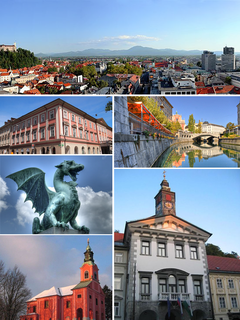
Ljubljana is the capital and largest city of Slovenia. It is the cultural, educational, economic, political and administrative centre of the country.
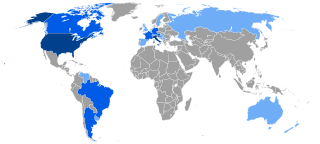
The Slovenes, also known as Slovenians, are a South Slavic ethnic group native to Slovenia, and adjacent regions in Italy, Austria and Hungary. Slovenes share a common ancestry, culture, history and speak Slovene as their native language.
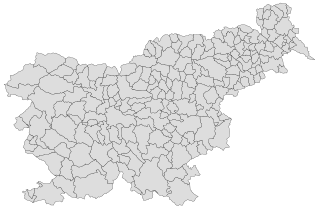
Slovenia is divided into 212 municipalities, of which 12 have urban (metropolitan) status. Municipalities are further divided into local communities and districts.

Nogometni klub Maribor is a Slovenian professional football club based in Maribor, Slovenia. It competes in the Slovenian PrvaLiga, the top tier of the Slovenian football league system. Nicknamed "The Purples", the club was founded on 12 December 1960. They are regarded as a symbol of Slovenian football, particularly in their home region of Styria in northeastern Slovenia.
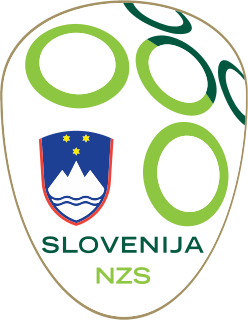
The Slovenia national football team represents Slovenia in men's international football and is controlled by the Football Association of Slovenia, the governing body for football in Slovenia. The squad is under the global jurisdiction of FIFA and is governed in Europe by UEFA. It competes in the three major professional tournaments available to European nations: the FIFA World Cup, UEFA Nations League and the UEFA European Championship. Slovenia played its first official match in 1992, one year after the country gained independence from Yugoslavia. The majority of Slovenia's home matches are played at Stožice Stadium in Ljubljana.
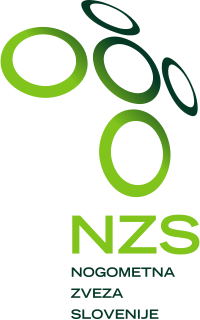
The Football Association of Slovenia is the governing body of football in Slovenia. It organizes the first division, second division, third division, Slovenian Cup, Slovenian Women's League, and other competitions. It is also responsible for the Slovenia national football team and the Slovenia women's national football team. It was founded as Ljubljana Football Subassociation on 24 April 1920.

Omar Kareem Naber is a Slovenian singer, songwriter and guitar player. He first represented Slovenia at the Eurovision Song Contest 2005 in Kyiv with the song "Stop" and for a second time at the Eurovision Song Contest 2017 in Kyiv with the song "On My Way", but failed to qualify to the final on both occasions.

Nogometni klub Olimpija Ljubljana, commonly referred to as Olimpija Ljubljana or simply Olimpija, is a professional football club, based in the city of Ljubljana, Slovenia. The club competes in the Slovenian PrvaLiga, the country's highest football division.

The Ten-Day War, or the Slovenian War of Independence, was a brief conflict that followed Slovenia's declaration of independence from Yugoslavia on 25 June 1991. It was fought between the Slovenian Territorial Defence and the Yugoslav People's Army. It lasted from 27 June 1991 until 7 July 1991, when the Brioni Accords were signed.

The Slovenian PrvaLiga, currently named Prva liga Telemach due to sponsorship reasons, also known by the abbreviation 1. SNL, is the main football league in Slovenia, and was formed in 1991 after Slovenia became an independent country. From 1920 until the end of the 1990–91 season, the Slovenian Republic League was a lower division of the Yugoslavian league football system. The league is currently governed by the Football Association of Slovenia. Between 2001 and 2012 the league was governed by the Association of 1. SNL. Celje and Maribor are the only two founding clubs that have never been relegated from the league since its foundation in 1991.

Goran Dragić is a Slovenian professional basketball player for the Brooklyn Nets of the National Basketball Association (NBA). Nicknamed "the Dragon", he had played professional basketball in Slovenia and Spain before entering the NBA in 2008. Dragić has also played for the Phoenix Suns, Miami Heat, Houston Rockets, and Toronto Raptors. He was an All-NBA Third Team selection and the NBA Most Improved Player with the Suns in 2014. He was named an NBA All-Star for the first time in 2018 with Miami. He led the senior Slovenian national team to its first FIBA EuroBasket title in 2017, while being named the Most Valuable Player of the tournament.
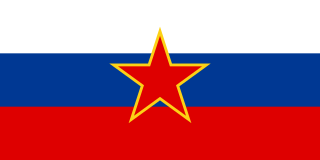
The Socialist Republic of Slovenia, commonly referred to as Socialist Slovenia or simply Slovenia, was one of the six federal republics forming Yugoslavia and the nation state of the Slovenes. It existed under various names from its creation on 29 November 1945 until 25 June 1991. In 1990, while the country was still part of the Yugoslav federation, the League of Communists of Slovenia allowed for the establishment of other political parties, which led to the democratization of the country.

Education in Slovenia from primary to secondary schooling is regulated by the National Education Institute of the Republic of Slovenia (ZRSŠ), whose scope includes education programmes, delivery and development.

The statistical regions of Slovenia are 12 administrative entities created in 2000 for legal and statistical purposes.


















